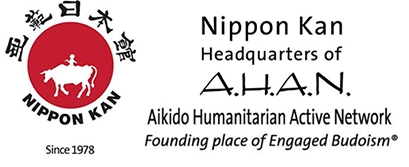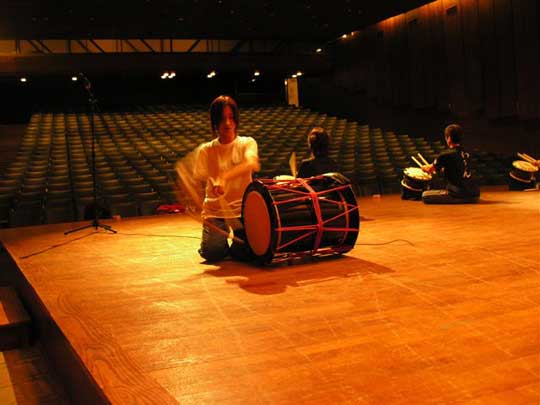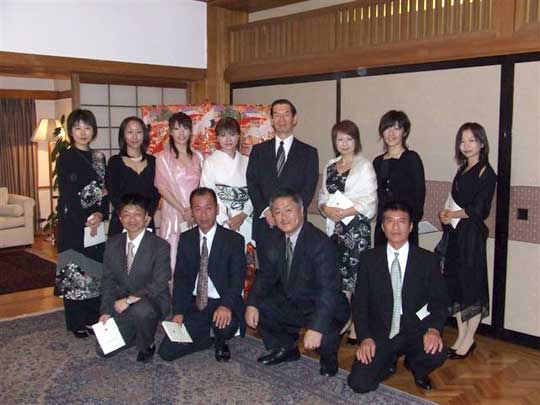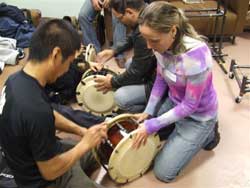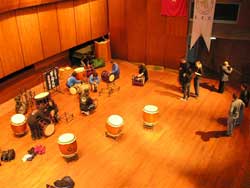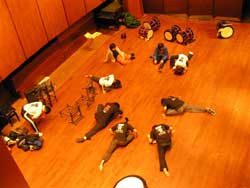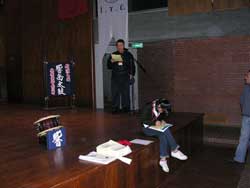Written by Gaku Homma
November 15th, 2006
After checking through immigrations at the Istanbul Airport, all ten drummers paused on their way to their gate to smile and wave farewell. They all had a glow on their faces, a look that reflected the success of the last week together in Turkey. The Turkish volunteer staff, which had spent countless hours volunteering their time to coordinate the AHAN International Concert Series 2006 in Ankara, Cappadocia and Istanbul, Turkey stood and watched as the drummers stopped to wave. We all waved back to the new friends the drummers had become on this trip to Turkey.
Housewives, government workers, social workers, business owners, farmers and even a pharmacist; all ten drummers are ordinary people with their own lives, careers and families waiting for them back home in Matsukawa, Japan. Ordinary maybe, but standing in front of their drums with a set of drumsticks in their hands, the Matsukawa Kyougaku Taiko drummers become transformed into something quite extraordinary.
You can almost see a spark, as the drummers come alive; their entire beings concentrated on the drums before them. I have been watching these drummers for six years, and I think I am finally just beginning to understand a little bit about where their power might come from. It is the same power I have witnessed in extraordinary martial artists as well.
Matsukawa Village first began high in the Northern Japanese Alps of Honshu island in Nagano Prefecture, Japan, centuries ago. Today, surrounded by the majestic mountain peaks, the Matsukawa Kyougaku Taiko Drummers live their lives in Matsukawa Village and practice their drumming at the Matsukawa dojo. These drummers have played their drums in concert all over the islands of Japan and in countries all over the world.
In conjunction with AHAN, (the Aikido Nippon Kan Active Network) and Nippon Kan Headquarters in Denver, Colorado, the drummers have performed many fundraising concerts to promote humanitarian aid and cultural awareness.
In 2004 the Matsukawa Drummers performed a fundraising concert series for AHAN humanitarian efforts in Mongolia in Denver and Telluride Colorado USA , co-sponsored by the Consul General of Japan to Denver, the Japanese America Society and the Japan Association.
In 2005 the drummers performed another series of concerts in conjunction with AHAN Rio de Janeiro to support AHAN humanitarian assistant programs in Rio de Janeiro, Brazil, co-sponsored by the Consul General of Japan to Rio de Janeiro, the Nagano Prefecture Association and the Rio de Janeiro Sports Association.
In 2006, AHAN’s International Concert Series featured the Matsukawa Drummers in Turkey where on a whirlwind tour, the drummers performed three major concerts in three different cities, were featured live on numerous television and radio stations and were photographed and interviewed for articles in all of the major newspapers. All of this in one week’s time!
The Japanese Embassy to Turkey co-sponsored this concert series in Turkey; the first concert held in the capitol city of Ankara, the second in the world heritage city of Urgup-and Cappadocia and the third concert held in the historical city of Istanbul. All three concerts were incredibly successful due to the talent of the drummers and the generosity and support of all of the Turkish staff and supporters. I give my sincere thanks to everyone for all of their help, time and energy!
Before the first concert in Ankara, Ambassador Tomoyuki Abe held a luncheon for all of the drummers at the Japanese Embassy mansion. Ambassador Abe was a gracious host and wished all of the drummers well on their adventure ahead.
Ambassador Abe spoke to the drummers before the luncheon. “For centuries, the two countries of Turkey and Japan have had a good relationship. However, there is a great distance between our two countries not only geographically, Historically there have been no wars or other problems between Turkey and Japan, but friendly relations do not necessarily equal culture understanding.
I travel every day from my residence to the Japanese Embassy in Ankara in a diplomatic car. The automobile in which I travel has a Japanese flag attached to the antenna. As I pass through the streets of Ankara, the people of Ankara smile and wave. This I believe is a friendly gesture, but I also realize that this friendliness does not reflect an understanding of Japan or Japanese culture. Our job here in Ankara is to build this friendliness into a deeper cultural understanding between our two countries.”
I agree with the words of the Ambassador. I am a Japanese martial artist that too has lived outside of Japan for decades. I am honored to have many students, and the opportunities to travel to many countries. As a leader in AHAN I have had many wonderful experiences with the people I have met, but I too have learned that friendliness and enthusiasm does not always equal an understanding of Japan or Japanese culture.
*****************
Foreigners who live in Japan to study Japanese martial arts or other cultural studies STILL attract attention, sometimes even making the news with the local media especially in rural Japan. “The blue eyed gaijin (foreigner) joined the festival last week…” the papers might say. It doesn’t matter if the foreigner in question really has blue eyes or not, it is a colloquial term for all people from other developed countries in Japan to be called “blue eyes”. This actually is a term of endearment and respect in Japan and “blue eyes” are of even greater value in the smaller towns and villages in the Japanese countryside.
While most foreigners that live in Japan contribute positively to the local communities in which they live, the unqualified admiration of Westerners by Japanese people has on occasion been taken advantage of or misunderstood. I have seen foreign martial art students for example who after training in Japan have returned to their own country with a false sense of their own accomplishments due to the innocent admiration bestowed upon them in Japan.
In my experience, for foreigners to believe that they understand Japanese people or culture because they have visited Japan, even if they have lived there for a while, is a mistake. It is also a mistake for Japanese people to think they understand America or American people even if they have lived in the United States for long periods of time. It is an illusion on both parts. In Japan, sometimes Japanese people make an assumption that foreigners who can eat raw octopus or speak some Japanese, must understand Japan and Japanese culture. This also holds true in reverse; in the United States, sometimes American people make the same assumptions if someone from Japan speaks fluent English for example.
This sociological trait of unqualified admiration of Westerners has been evident in Japanese history since the Meiji period when Japan was first introduced to European and eventually American ways in the world. This first introduction to the outside world had an interesting effect on Japanese people and an important effect on their culture.
“Yoko kaeri” is a Japanese term used to describe affluent Japanese who (even as early as the late 1800’s) traveled to Europe to tour or even study abroad. Not only did these Japanese travelers become “instant experts” on Western culture, but upon their return, but there was a tendency for them to look down upon their own traditions and culture; preferring instead to exercise the latest in Western trends and fashion.
Neighbors, families and friends of these new “cultured” Japanese travelers looked up to the travelers exhibiting this new “yoko kaeri” attitude with an innocent sense of awe; marveling at the traveler’s experiences and new wisdom of the ways of the world. New Western fashions became more of the norm as Japanese people back home imitated these new trends brought back from the foreign lands abroad.
Even in our modern world, this phenomenon still exists today in Japan, manifesting itself as the “blue eyed gaijin syndrome”. Relationships built upon this foundation have throughout history been mostly positive, but many misunderstandings can and have occurred between people in Japan and in Western countries do to a basic lack of understanding in the fact that cultures and values as well as environments are truly different in each country.
To understand each other, I think we first must understand that there are basic integral differences in people raised in different cultures. This sounds like a very simple point, but if we understand this point, we can work towards a more real understanding of one other. It is dangerous to assume that people might be thinking, feeling or seeing the same way when dealing with people from different backgrounds and cultures. Cross-cultural exchange IS this process of true discovery about one another, and in my experience comes from A. working together and B. understanding the differences as well as the similarities between cultures.
When the Matsukawa Kyougaku Taiko Drummers travel to other countries to play their music, it is not only the performances and the audience’s response to the music that is valuable. This is not the only measure of the success of a tour. What is more important for the drummers and all of the people involved on a local level at each location is the process of putting the concerts together.
In all of the planning, there are always challenges or problems to solve and overcome; there are different cultures, languages, traditions and beliefs to account for in the planning. It is the working together on both sides of the aisle where the benefit and learning arises in these cross-cultural projects. Projects of this magnitude require a multi-level, multi-directional effort. It is not just introducing Japanese culture to another country; it is the people from all countries involved learning from each other by DOING.
With an attitude of mutual openness, good communication, relationships, friendships and success can be achieved. As historically established, Japanese people have had openness to other cultures. Many aspects of Japan’s religions, foods, architecture, arts and life styles have all been assimilated from the cultures of many other different countries.
In my travels, studies, teaching and writing, if I were to take the position that Japanese culture was superior to others in the world, I would never have an opportunity to truly learn, communicate, understand or in other ways have a true exchange of ideas with people from other countries. Openness has been always been an integral part of my philosophy and all of our Nippon Kan activities.
*****************
I have experienced two types of Japanese drumming performances. The first type I would classify by the “show” they put on. Special lighting, special effects, stage smoke, sound systems, and flashy costumes define the power of their performances. There was a very famous Japanese Taiko drumming group that came to Denver to play in an outdoor amphitheater in the foothills west of town a few years ago. Because the stage was not enclosed in an indoor theater, many of the special effects could not be used effectively and the performance fell flat. The power of their performance laid with the technicians not the drummers.
For the other type of drummers, their power comes from their souls and from the earth. The sound of their drums speaks of real life, and is practiced every day in the festivals and celebrations of families and their village. There is no need for special effects with drummers like these; for the Matsukawa Kyougaku Taiko Drummers, life in their village is plenty backdrop enough.
Arriving in Turkey at 2:00 am.; without rest, the drummers spend two hours checking and tuning their drums.
As people had already began to arrive to see the concert, Mr. Chino, the leader of the group said “Why don’t we move the drums outside to the grassy area under the tree.” The problem was, the skies were threatening rain at any moment, and rain on the drums could cause irreparable damage. Despite the risk, Mr. Chino led the way as the drums were moved outside. Remarkably, without a word, members of the audience picked up their own chairs and quietly moved them outside. In just minutes, the drums and the drummers were set up outside and the show went on; and a fabulous show it was at that!I remember a day in Brazil when the Kyougaku Taiko Drummers were on the AHAN International Concert Series Tour 2005 to Brazil. We were in a small town outside of Rio de Janeiro, and were scheduled to play at a local universities gymnasium. This particular gymnasium happened to have a corrugated galvanized steel roof. When the drummers tried to play their drums in rehearsal, the echo was deafening and distorted the sound terribly. We soon decided that there was no way a concert could be held in that gymnasium.
For the concert series 2006 in Turkey to be organized, it took staff members in three different countries to work together. Even with the aid of communication via e-mail, we had three different languages to deal with as well; Japanese, English and Turkish. We did our best to plan well in advance; I even made two trips personally to Turkey in July and October to help with the organization “on the ground”. Last minute challenges and changes however were inevitable. Again Mr. Chino proved himself to be a very wise leader and very flexible toward any last minute adjustments that had to be made. His wisdom and flexible attitude made him easy to work with, putting the local Turkish staff at ease. Soon everyone was working as a team, despite language and cultural differences.
I imagine that if we had had a drumming group that required a lot of high maintenance, special equipment and special effects that the concerts in Turkey would have had to be cancelled. For the Matsukawa drummers on the other hand, drumming is part of their life and they are use to interaction with changing events and situations. Their drumming is not separated by a stage or confined to a script or menu.
- Ankara Coordinator Banu helps with the drums too!
- Setting the stage.
- Stretching; a secret to the drummer’s performance.
- Homma Kancho as M.C. and interpreter Megumi rehearsing seriously.
At the beginning of the tour, Ambassador Abe spoke about the need to take the next step towards showing the people of Turkey the true nature of Japan and the Japanese people. In my opinion, these ten drummers from the tiny village of Matsukawa in Northern Japan did exactly that… once again.The tour was not easy from start to finish. The schedule was tight; there were many hours on the road between cities and little sleep. The drummers caught the spirit and heart of the Turkish people however and together made history.
For the concert in Istanbul, tickets were sold to raise funds for the TEMA Foundation (the largest national environment protection foundation in Turkey) and for the Turkey Kidney Foundation. Travel expenses for the drummers while they were in Turkey were sponsored by AHAN Nippon Kan General Headquarters. The drummers themselves paid their own airfare and donated all of their performances. The drummers donated their time and paid their own airfare because they are great supporters of AHAN and were very enthusiastic about being able to participate in this special tour.
Before concluding this article I would like to mention all of the people back home in the Matsukawa village that helped make this tour possible. I want to thank everyone for supporting their husbands, wives and co-workers in participating in the adventure. Family, friends and neighbors of these drummers from Matsukawa should all be very proud! If the village of Matsukawa had a soccer team that went to the world cup finals, the village would be crazy with excitement. These ten drummers have accomplished something even greater; they have been able to inspire the people of another country, bring tears of joy to thousands of people, and cause enough sensation to be covered by the Turkish news media nation-wide! You can be very proud!
I sincerely appreciate the continued support of the entire Matsukawa Village, Nagano Prefecture, Japan, all of the Matsukawa Kyougaku Taiko Drummers, and the support of staff and friends in Turkey, Japan and the United States. Thank you all for a job well done!
Special Thanks to following:
Ankara
Embassy of Japan in Turkey
Ambassador of JapanTomoyuki Abe
Second secretary Mitsuhiro Toyama
Third secretary Akifumi Fukuoka
Turkey Japan Foundation Culture Center
Turkish Aikikai Aikido Ankara Students
Urgup City Leaders
Istanbul
Former Turkish Ambassador to Japan Mr. Yaman Baskut
Consul General of Japan Istanbul
Assistant Consul General Miho Adachi
The TEMA Foundation
Turkey Kidney Foundation
Istanbul Technical University
Turkish Airlines Istanbul Office
Albanian Airlines Turkish Office- Mr Seha Iscan
A TV
Turkish Aikikai Aikido –Ali Uludag Sensei
Turkish Aikikai Aikido Istanbul students
Turkish Staff Leaders
AHAN Nippon Kan Istanbul Coordinator Megumi Machi
AHAN Nippon Kan Ankara Coordinator Banu Alisverisci
Istanbul Historical bookstore owner
Matsukawa Kyougaku Taiko Drummers
Leader Eitaro Chino
Members
Nobuhiko Takahashi
Shigeru Yokoyama
Yuko Yamamoto
Yukika Matsuda
Keiko Kitazawa
Aya Yamamoto
Sanae Chino
Takako Matsushima
Yukari Nakajima
Chief Coordinator and Director and Staff
AHAN Nippon Kan General headquarter Denver Colorado U.S.A.
General Director Gaku Homma
General Coordinator Emily Busch
Nippon Kan Turkish communications Mehmet Kazgan
